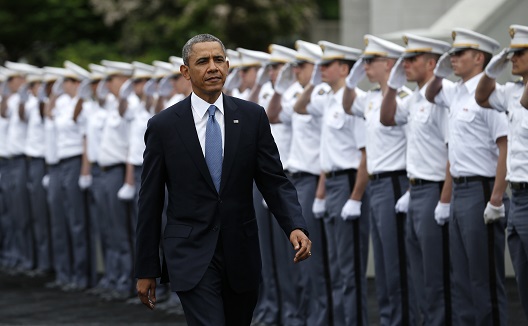 In his graduation ceremony remarks of May 28 at the United States Military Academy, President Obama implied an explicit new policy direction with respect to Syria. The president announced that he would call on Congress “to support a new Counter-Terrorism Partnership Fund of up to $5 billion, which will allow us to train, build capacity, and facilitate partner countries on the front lines.” According to the president, “A critical focus of this effort will be the ongoing crisis in Syria,” where “in helping those who fight [emphasis added] for the right of all Syrians to choose their own future, we also push back against the growing number of extremists who find safe-haven in the chaos.” There was neither a specific commitment to arm, train, and equip vetted Syrian rebel forces at levels significant enough to make a difference on the ground, nor a stated disinclination to do so. Neither was a clear objective articulated. Instead, the president simply supplemented his “helping those who fight” reference by saying, “I will work with Congress to ramp up support for those in the Syrian opposition who offer the best alternative to terrorists and a brutal dictator.”
In his graduation ceremony remarks of May 28 at the United States Military Academy, President Obama implied an explicit new policy direction with respect to Syria. The president announced that he would call on Congress “to support a new Counter-Terrorism Partnership Fund of up to $5 billion, which will allow us to train, build capacity, and facilitate partner countries on the front lines.” According to the president, “A critical focus of this effort will be the ongoing crisis in Syria,” where “in helping those who fight [emphasis added] for the right of all Syrians to choose their own future, we also push back against the growing number of extremists who find safe-haven in the chaos.” There was neither a specific commitment to arm, train, and equip vetted Syrian rebel forces at levels significant enough to make a difference on the ground, nor a stated disinclination to do so. Neither was a clear objective articulated. Instead, the president simply supplemented his “helping those who fight” reference by saying, “I will work with Congress to ramp up support for those in the Syrian opposition who offer the best alternative to terrorists and a brutal dictator.”
There has been persistent press reporting for quite some time of covert US arming, training, and equipping activities of vetted Syrian opposition fighters. If these reports are true, then President Obama seemed to signal at West Point that he would work with Congress to provide assistance of a fully overt nature to “those who fight.” Indeed, if support to armed Syrian rebels were to be a component of a congressionally appropriated “Counter-Terrorism Partnership Fund,” it would have to be entirely overt in nature.
If the president’s goal is to provide, no doubt in conjunction with others, Syrian nationalist fighters with training and materiel sufficient to make a difference on the ground, then the overall program would have to be overseen by the Department of Defense (DoD). Only DoD would have the personnel and resources sufficient to scale the assistance effort at a level sufficient to make a significant difference. And one or more of the countries bordering Syria would have to agree to host an arm-train-equip program aimed quite explicitly at offering “the best alternative to terrorists and a brutal dictator.” Any country willing to consider hosting such an endeavor would surely want ironclad American defense assurances. If, for example, Jordan were to agree to play such a role, it would want to know that the launch of a Scud missile or the dispatch of terrorists by the Assad regime would draw a devastating military response from the United States.
Those who were expecting from President Obama a full-throated, persuasive case for helping Syrian nationalists fight and win on two fronts—against an Iranian-supported regime propped up in western Syria and bands of jihadist primitives to the east—will be disappointed. Indeed, in claiming he made a decision not to “put American troops into the middle of this increasingly sectarian civil war” he implied, as he has done repeatedly, that someone had actually made a case for invasion and occupation. No one ever has. Still, while taking credit for having made “the right decision,” the president quickly added, “But that does not mean we shouldn’t help the Syrian people stand up against a dictator who bombs and starves his people.” This, at least, disposes of the argument that the United States should find a way to reconcile itself to Bashar al-Assad staying in power.
In sum, it would appear that a change of policy has occurred: that the president will seek the support of Congress in arming, training, and equipping Syrian rebels. Yet that change is being articulated by a president who truly wishes to believe he has gotten Syria right from the beginning. Hence the ambiguity. As always, however, action alone will matter. And that action, depending as it does on congressional cooperation, will require the president to make a case he believes in and one which, when implemented, would eventually make a significant change for the better on the ground in Syria. To use the kind of baseball analogy mercifully avoided by the president at the Military Academy, there appears to have been a windup. The pitch has yet to be seen.
Frederic C. Hof is a resident senior fellow with the Atlantic Council’s Rafik Hariri Center for the Middle East.
Image: President Barack Obama arrives for a commencement ceremony at the United States Military Academy at West Point, New York, May 28, 2014. Obama's commencement address was the first in a series of speeches that he and top advisers will use to explain U.S. foreign policy in the aftermath of conflicts in Iraq and Afghanistan and lay out a broad vision for the rest of his presidency. (Photo: REUTERS/Kevin Lamarque)
